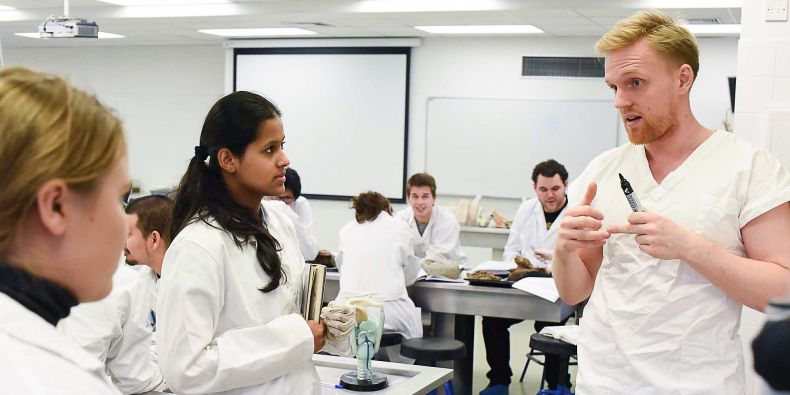Simen Brekke first heard about Masaryk University from Norwegian students who studied medicine in Brno. They were happy with their studies and recommended the university to others. This was one of the reasons why the Norwegian student decided to change his home city of Oslo for Brno for six years. “Time flies really fast here,” says the 25-year-old med student, who is now in his fourth year of studies at the Faculty of Medicine.
The first three years of study proved more difficult for him, as they were more theory-oriented. As Brekke describes, “We had a lot of chemistry, biology, biochemistry, and other theoretical classes. But this year we have already started our training in hospitals around Brno. Every two weeks, we rotate between different departments, such as surgery, ENT, or the paediatric department.”
Even though Brekke studies in an English-language medical programme, he and other international students must complete eight semesters of Czech classes. This is necessary for the hospital training, as the students need to be able to communicate with Czech patients. “Czech is a difficult language, especially the grammar, but I have been improving year by year,” says Brekke.
Three times a university representative
Classrooms and hospitals are not the only places where Brekke can practice his Czech: three times a week, he attends ice hockey practice in Rosice. “As I am the only foreigner, we mostly speak in Czech. My teammates talk really fast and use a lot of slang words, so I sometimes struggle to understand them,” he says. He goes on to add, “Unfortunately, they don’t speak much English, which is something I notice in a lot of young people. But what surprises me even more is that the Czechs don’t want to speak English even when I know they can and that they understand me. They are really needlessly afraid.”
The ice hockey team of Rosice is not the only Czech team for which Brekke plays. He has also represented Masaryk University three times in matches against VUT in the Ice Hockey Battle of Universities. “It’s very exciting to be on the ice in front of a sold-out stadium,” he says. “The best thing about sports is the atmosphere they create.”
Sold-out stadiums are something that Brekke is used to from Norway, as he used to play in the Norwegian national ice hockey league only several years ago. As he describes, “We competed in the World Cup and Continental Cup and travelled to matches around the world. I spent five years as a professional ice hockey player, but then I got mononucleosis and it took me a year to recover. And right after that I broke my collarbone and had to quit hockey altogether, even though it has always been my childhood dream.”
Half of the study fees paid by the Norwegian government
When his ice hockey career was over, Brekke had to find a new path. As he explains, “I always liked biology and chemistry and as a kid I always looked up to doctors; and so I started considering medicine.”
However, it was impossible for him to be accepted as a medical student in Norway, as during Brekke’s ice hockey career, school came second. In his words, “Medicine is a very prestigious field of study in Norway. There are only a couple of hundred places for the whole of Norway and they only accept candidates with the best school results.”
This is why a number of Norwegians go abroad to study medicine. They have to pay for their studies abroad – at Masaryk University, for example, annual tuition amounts to two hundred and fifty thousand crowns – but the Norwegian government reimburses half of the cost if the students successfully pass their exams.
For Norway as a country, this system pays out: Norwegians study for free at home and the government spends around six million crowns per one student of medicine. So, as Brekke adds, “It’s cheaper to subsidize our studying abroad.” A similar system operates in Finland and Sweden.
Brekke is happy with his studies at Masaryk University. In his opinion, “The premises of the faculty are very up-to-date and we have great teachers. While the Norwegian system may be a bit more modern and the classes more focused on problem solving, Czech teachers give more in-depth information, so we learn more.” As well as being a student, Brekke is also an ambassador of the Faculty of Medicine and provides insider information about studying in the Czech Republic to those who are interested in the English-language study programme.
After completing his medical studies, Brekke wants to go back to Norway and become an orthopaedist. “I will miss Brno. It is my second home now with a great international community, where I have met people from all over the world, as well as a lot of Czechs. What I like about the Czechs is their sense of humour, they are making jokes all the time.” He laughs as he adds, “I will also miss the Czech beer, that’s a huge plus to studying in the Czech Republic.”
